If someone asked me when I first became a feminist, I wouldn't be able to tell them. I think over the years, my perspective on feminism has shifted — in the best way possible — as I've learned more and heard stories from women all over the world. It's a buzzword, but "empowerment" is always the first thing that comes to mind whenever I discuss feminism. Empowering women is more than just handing them knowledge and power; it's about learning who you are — as a woman — at your very core. Because women are fundamentally different from men, and we experience life differently, it's important for us to recognize who we are and what we're capable of. Furthermore, understanding feminism means understanding your own societal expectations and limitations. I'm an unmarried, white Christian woman in her late twenties who lives in the United States. So understanding what feminism looks like for me means something different than it does for other women in my country and across the world.
But what I truly admire is the fact that over the years, media has expanded to include more and more types of women who represent their own pockets of culture and countries, and who demonstrate how to push and break barriers. Television, in particular, has done a great service in writing diverse, inclusive, and incredible female characters recently. Characters like Parks and Recreation's Leslie Knope, shows like Orange is the New Black, and even a character like Stranger Things' Eleven have all proven that women are worthy of carrying incredible storylines that are not always dependent on men or romance.
And you can bet that you should also add Pitch to that running list of female-positive shows.
I'll argue something bold here: Pitch is one of the most female-positive, if not the most female-positive, shows on television currently. In a field (pun intended) dominated by men, Pitch is a show about Ginny Baker (Kylie Bunbury) breaking through barriers to become the first female pitcher in major league baseball. If it sounds boring to you, let me assure you from a non-baseball fan standpoint: it's not. At all. In fact, it's one of the most engaging shows on television right now because it doesn't heavily rely on knowledge of source material in order to gain audience attention. Instead, it focuses on our protagonist, Ginny, as she not only navigates a new team and a new dynamic but also as she learns how to cope with the pressures of being the one female role model in baseball that seemingly everyone looks up to.
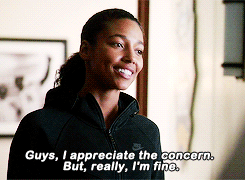
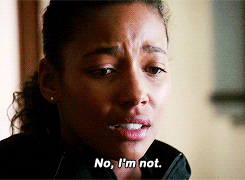
Over the past few weeks, Pitch has done a tremendous job in depicting the burden of pressure that Ginny feels, every time someone looks at her to be the role model simply because she's a woman. While the honor of playing in the major leagues is just that — an honor — it's also an incredibly heavy weight to bear for a young woman in her twenties. And the show reminds us that women are expected by societal standards, more so than men, to have our crap together.
We're expected to be thin, but not too thin. We have to look presentable, all the time. We have to smile constantly and act gracious. We cannot be brash or angry, lest our anger be blamed on our "that time of the month." We have to be able to cook and to clean, but also be able to do all of the things that men are able to do as well, lest we be labeled something like a "damsel in distress." We have to have knowledge, but never use it to overshadow men. We have to contribute to conversations, but cannot dominate them. We have to do it all, but we also can't do it all — we are told to fit into boxes but by the time you are an adult, you realize that you're expected to clone yourself and fit into all kinds of different boxes. There is, plain and simple, a different standard placed on women than men.
Men are also handed expectations by society, sure; but Pitch makes an incredible point in this week's episode titled "San Francisco," when nude photos of Ginny leak on the Internet: men on the baseball team have far worse on their phones but if that came out, the public would barely bat an eye. The moment that Ginny reveals to Blip (Mo McRae) — who is, by all accounts, an incredibly kind and well-meaning male character — that she and her boyfriend took the photos years ago, Blip is aghast. He tells her that she needed to be smarter and that if she didn't want photos like that online, she shouldn't have taken them in the first place.
Ginny Baker, however, holds her ground and essentially tells Blip that his response is part of the problem: the only person who did anything wrong was the person who hacked her ex-boyfriend's account and stole those photos to post them on a sketchy website. Women are expected to be all sorts of things, and Pitch never fails to remind us of that. And when they don't live up to being those things, they're shamed — either publically, or subtly. It also doesn't fail to remind us of that.
Moreover, though, Pitch never fails to flip tropes (whether related to gender or not) on their heads. A few weeks ago, an episode aired where Ginny essentially hits her breaking point. She's tired of the spotlight and tired of having to be everything for everyone — a role model and a perfect ballplayer, because the second she messes up, it's all her fault, etc. — and breaks down. When the managers confront her with the video recording of her breakdown, Ginny puts on a brave face. Because that's what we, as women, are taught to do. Nothing can ever rattle us — not our circumstances or our kids or our significant others — because society tells us that strong women have it all together, all the time. It's only when Ginny recognizes her own brokenness that she's able to be the kind of person she is supposed to be: a healthier individual who can heal from the things that bother her, rather than run away and pretend they're okay.
And in regards to flipping a trope on its head, "San Francisco" found Ginny coming up with a brilliant solution to reduce any backlash from her nude photos: she put her body on display herself. She took back the narrative and removed the stigma of nude photos, coming up with the idea for the team to do a nude photoshoot for a magazine. Rather than allow people to publically shame her and — by extension — her body, Ginny made sure that the media focus was not on those hacked photos, but on the ones that she chose to take and have published. It was such an amazing way for Pitch to tell women all over the world that we have the power to control our own narratives, and that we can take things that people may design for harm and use them for something good.
(In fact, the show also dedicated part of an episode to a discussion about sexual assault and it was amazing and I could talk forever about it, but another +1,000 points to Pitch for being so pro-women.)
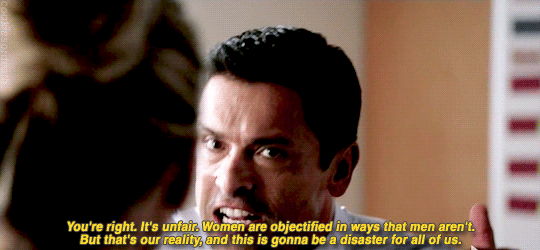
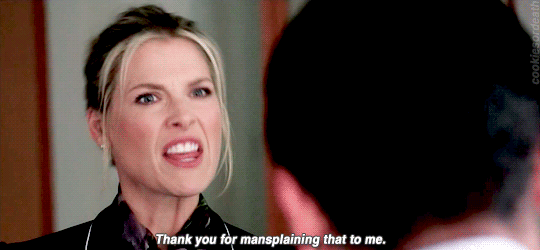
Numerous times in the show, Ginny mentions how she doesn't want to cause any trouble or garner media attention more than her male ballplayers. This was an issue of tension between the team early on in the series, because Ginny was constantly in the spotlight. She's conditioned herself to believe that if she pretends that she's just one of the guys, then they will like her and she won't be the source of dissension. It's sad, of course, that Ginny wants to balk and run away from the things that make her so special, but it's also understandable that she wants to do this because of her gender — because she would often rather be meek and ensure that she doesn't stand out than to accept that she is different.
I'm grateful that Pitch exists because it's provided us with a layered, dynamic female character and heroine who is flawed and strong in the sense that she's often uncertain and doesn't always do the right thing. I think that too many people confuse "strong, female character" with "a woman who can wield a weapon, never cries, and doesn't need anyone else." Pitch has proven, in spades, that strong women are those who use their talents and abilities to tell the world that they are extraordinary; strong women are those who decide to fight — sometimes with tears and sometimes with rage and sometimes with silence — against those who might silence them.
And the show never seems to do this at the expense of the men. It doesn't say: "feminism means women rule everything and men are just to be silent and do nothing." Feminism (in my opinion) is the movement that seeks not to dehumanize women, the end result being that that men and women work side-by-side as equals. Pitch continues to portray depth in male-female relationships, with Ginny occasionally having to apologize for being wrong, and the men occasionally having to apologize for being wrong too. (Most notable is in Ginny's relationship with her catcher, Mike Lawson — played excellently by Mark-Paul Gosselaar.)

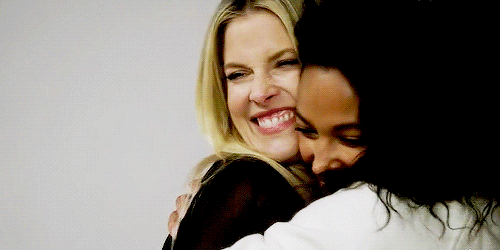
But while I love the dynamics between the men and women on this show, I think one of my favorite elements is the dynamic between the women on the show. They — Ginny, Evelyn (Meagan Holder), and Amelia (Ali Larter) — are all so different. Amelia is cutthroat and business-like because that's who she has to be, but she's also very attentive to the needs of the people around her. Ginny is often guarded but has this amazing sense of humor that is dry and sarcastic. And Evelyn is the kind of woman who walks into rooms with purpose — she sticks by her convictions and her man. She is the epitome of loyalty in her relationships, while also being the listening ear for the people who need her most.
None of these women are tropes. And none of these women are torn down by the show in order to pave way for a man (or vice versa). Amelia is very pragmatic in a lot of ways (sometimes to conceal the kind of heart that is damaging to have in her line of work), and that can occasionally be her stumbling block. But she's not really cold. She's funny and sensitive and is vulnerable with the people closest to her. And Evelyn isn't just loyal, either. She's fiercely protective of the people closest to her and also her opinions. She fights to be heard and respected by the people around her and does not stop until she is.
What this show does right is prove that female characters can write their own stories — that if a character is interesting enough, writers don't need to rely on tired plots or tropes in order to make them more appealing to an audience. Instead, Pitch bargains that the heart and soul of the characters they wrote will shine through. And it does.
What this show does right is prove that female characters can write their own stories — that if a character is interesting enough, writers don't need to rely on tired plots or tropes in order to make them more appealing to an audience. Instead, Pitch bargains that the heart and soul of the characters they wrote will shine through. And it does.
If you aren't yet watching this show, please do. This post focused specifically on the female-positive message that the show broadcasts — which is so important and integral to the plot of the series — but it is also a show that has a lot of humor, wit, heart, incredible music, and one that does flashbacks incredibly well (#sorrynotsorry, Arrow).
When you really boil it down, Pitch is the story of what it means to learn who you are in a world that tries to tell you who you are. And whether you're a man or a woman, I think we all can learn something from that message.


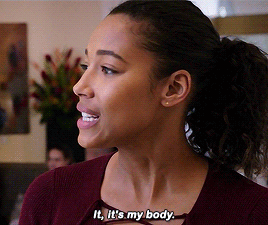
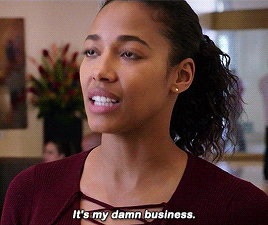
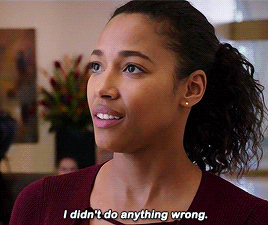
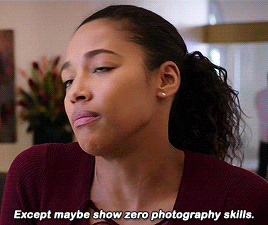



I loved this post so much, Pitch is such a nice surprise, Ginny is a very interesting character and I liked how their dealing with her fragility and strength.
ReplyDeleteBut I disagree about the flashbacks, it’s the only thing that bothers me in the show, they try to explain the characters and justify their actions with flashbacks, sometimes some things just are.